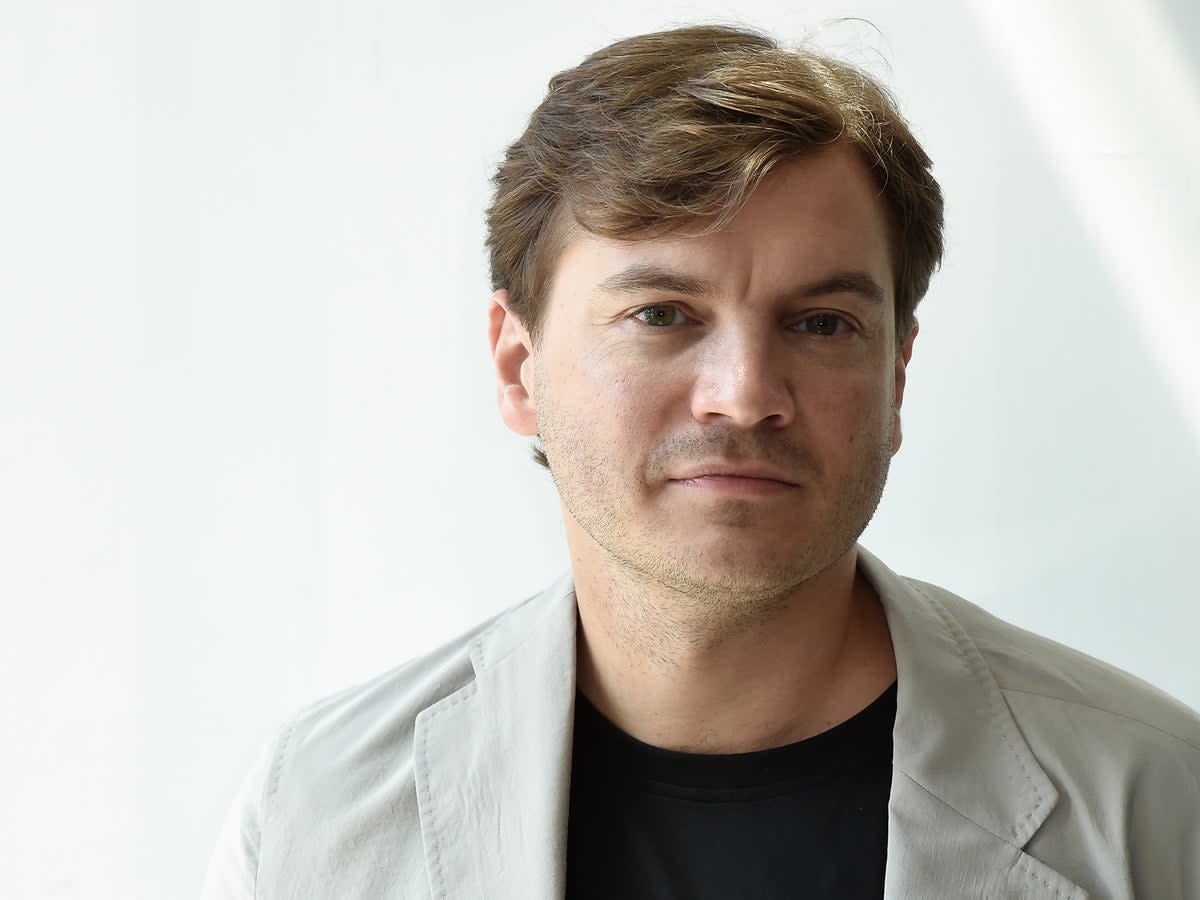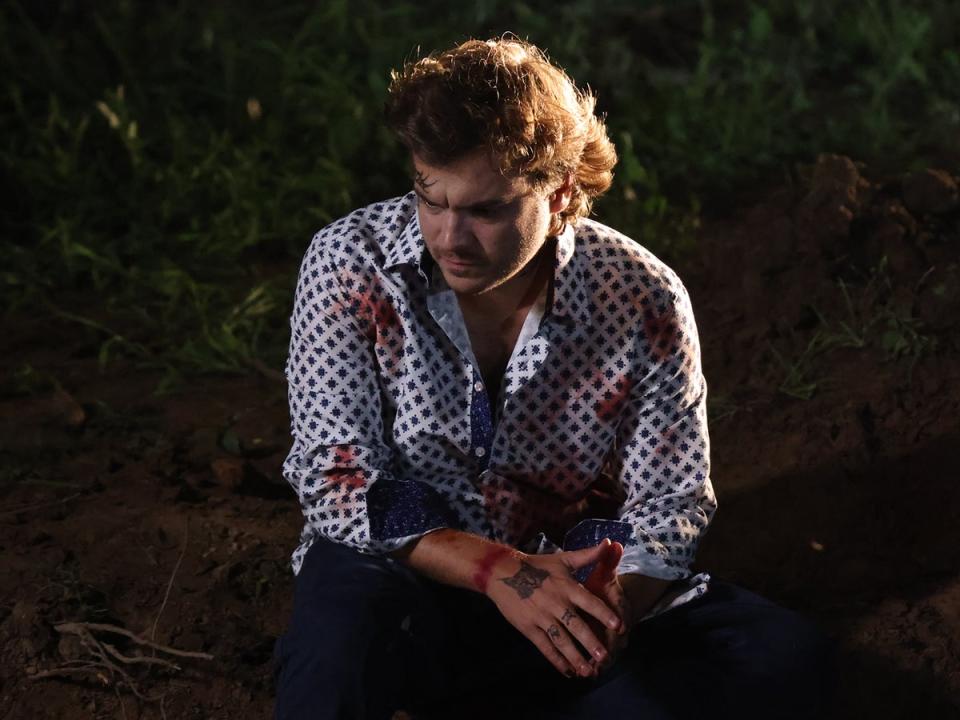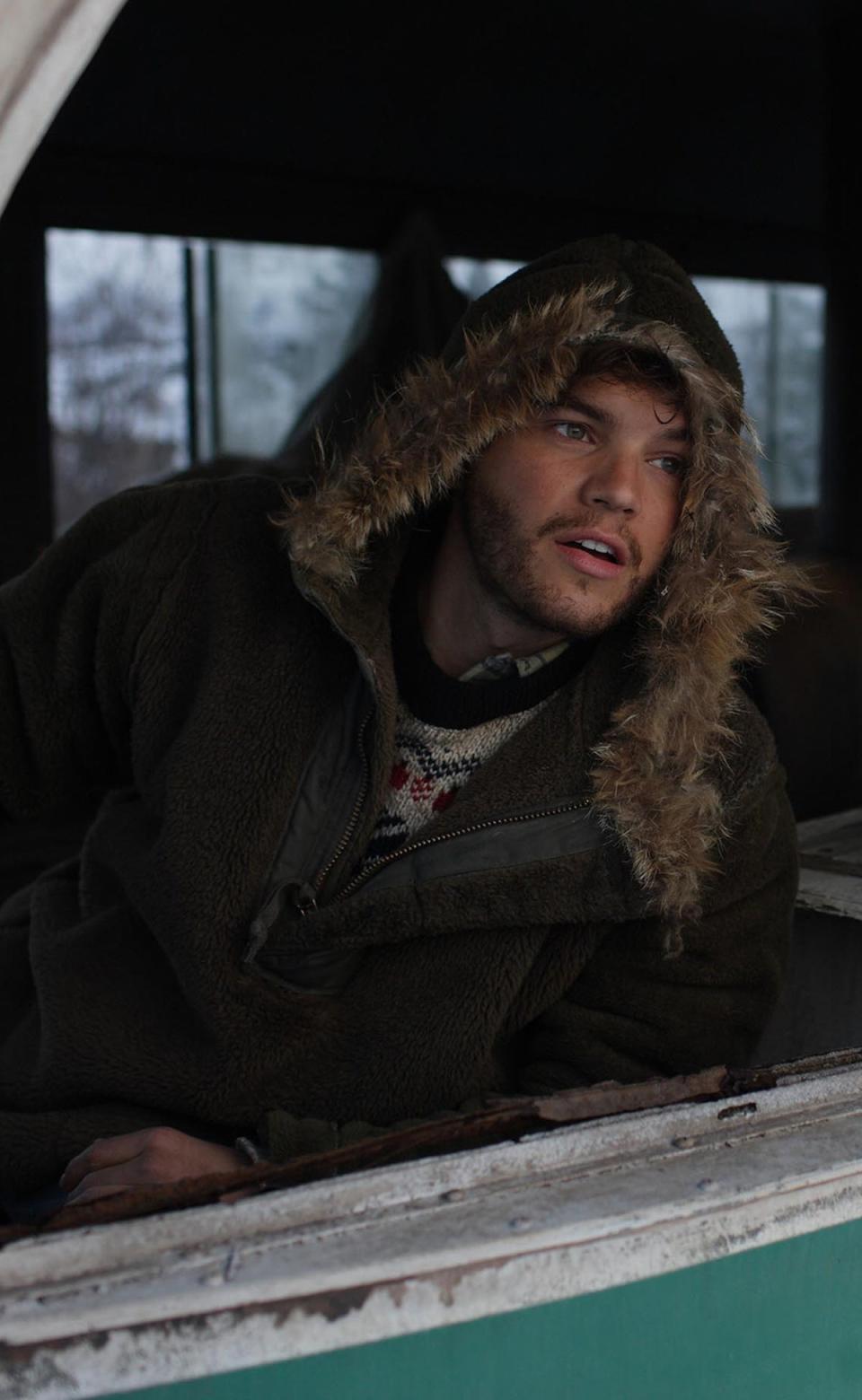Emile Hirsch on remorse, wanderlust and child stardom: ‘I was wary of the dark underbelly of Hollywood’

Emile Hirsch had been asked to play a bad guy. The action movie Pursuit was a quick money gig: fast shooting, three days of work, one of which would be spent with John Cusack as a crime boss who conducts his business around an outdoor barbecue. His own character wasn’t all that interesting – a fugitive murderer whose family has been kidnapped. But Hirsch, best known for playing the titular Speed Racer in the cult 2008 actioner and the tragic American nomad Chris McCandless in Sean Penn’s Into the Wild (2007), still wanted to have some fun with it. “I thought: ‘OK, I’ll just do an Elon Musk impression for the whole movie,’” the 38-year-old laughs, as if it was the most obvious idea in the world. “In fairness, it’s probably not even a good Elon Musk impression. Because I don’t think anybody actually got it.” He grins, sighs and holds his hands up in mock regret.
Pursuit, which is available for digital download now, is an incredibly stupid movie that gets by on its relentless insanity. Hirsch’s Rick is erratic, noisy and covered in face tattoos, and if his dialogue seems particularly free-wheeling and nonsensical, that’s pretty much because it was made up on the fly. “Our director, he was like, ‘yeah, don’t worry about the script – just improvise your lines the whole time if you want.’ So there are whole scenes where I’m just, like, saying anything on camera.”
Hirsch is at home in Los Angeles, groggy yet energetic after two weeks of night shoots on a poker movie called Degenerate. While his early career was dominated by auteurs (he’d worked with William Friedkin, Ang Lee, Gus Van Sant and Lilly and Lana Wachowski all before he’d turned 25), or teen sex comedies such as the surprisingly sweet The Girl Next Door (2004), his present-day career can be split into two halves. One is the smart indie pile, like his grisly 2016 two-hander with Brian Cox called The Autopsy of Jane Doe. The other is made up of straight-to-streaming action films, in which one or more of a very specific collection of men (Cusack, but also the likes of Stephen Dorff, Michael Madsen or Bruce Willis before he retired) hold big guns on the poster art. He’s occasionally in a modern masterpiece, too – that was him, you may remember, as Sharon Tate’s hairdresser Jay Sebring in Quentin Tarantino’s Once Upon a Time in Hollywood (2019).
He just loves movies, he tells me. Watching them. Making them. Even if some of them are sort of terrible. “I saw all the best stuff really young. I was one of those weird kids binge-watching movies and burning through all the sections of the video store. If I hang out with guys that know about football and every player’s stats or whatever, I don’t know what the f*** they’re talking about – movies, though, I’m like Mister Aficionado.”
Even when he’s not rambling like a Twitter CEO and firing an Uzi while running around in his underpants – Pursuit, if I haven’t sold it enough already, is a trip – Hirsch is a performer of near-feral intensity. He was, especially if you came of age in the late Noughties, synonymous with a particular strain of sun-kissed abandon. Few could watch Into the Wild and not also want to flee to the furthest outreaches of the world (many seduced by it would come to conveniently forget that the real McCandless died hungry and alone in the Alaskan wilderness). When he tore off his clothes to dance naked with hippies in Lee’s Taking Woodstock (2009), you wanted to do it, too. Some of us even tried vainly to emulate his wispy, shoulder-length haircut as Seventies skateboarder Jay Adams in Catherine Hardwicke’s Lords of Dogtown (2005), but let’s not talk about that. And all of this is why it was so horrifying – and disappointing, and sad and confusing – when Hirsch seemed to throw it all away in a moment of violence.
During the Sundance Film Festival in 2015, Hirsch attacked a female film executive in the middle of a busy party. In a statement, the executive said she was grabbed from behind, pulled to the floor, put in a chokehold by Hirsch so forcefully that she “couldn’t breathe”, and that it took two bystanders to pull him off her before police arrived. Charged with aggravated assault and intoxication, Hirsch pleaded guilty as part of a plea deal later that year, spent 15 days in jail, paid restitution to his victim and went to rehab. It was an act of violence that has justifiably reverberated through his career ever since, along with people’s responses to him personally.
It was the worst moment of my whole life by far. The lowest. In the most public place possible
“It was scary because it was so wrapped up in binge drinking,” he says now. “I had no memory of what happened. So I’m reading the stuff the next day, like, ‘What?’ I was dumbfounded. Horrified. It’s like if you drink too much and then you wake up and you’ve done this horrible thing.” He takes a long pause. “It’s something that should have just never happened. Sometimes people – not everybody – have these moments where you let yourself down or you let other people down. And you can say you’re sorry and mean it and move forward, and try to be the best parent and make a living for yourself and still love your art and still love your family and your friends. And that’s sort of what I’ve chosen to do. I think… I hope that I can be a better person as well.”
He takes another long pause. “It was the worst moment of my whole life by far. The lowest. In the most public place possible. At the most famous film festival in America, you know?” Has he ever figured out why he actually did what he did? “I’m hesitant to talk very specific about it, you know? Because I think, yeah…” He trails off. “It certainly led me to do a lot of the emotional work and the therapy that I think I probably should have been getting when I was younger, you know what I mean? Getting famous really young, having a harder time trusting people, I’ve been able to learn my own mechanics more, and do a lot of the work that I put off doing when I was younger because I was scared.”

The Emile Hirsch that first set foot in Hollywood was someone specifically determined to stay on the straight and narrow. He’d got an agent at the age of seven, after discovering that he had a vague connection to many of the young actors he was watching on TV – dozens of them had been taught by his grandfather’s brother and his wife, who were prolific teachers hired by Hollywood studios to educate child actors on sets. “They’d say, ‘Oh, yeah, we worked with Elijah Wood on this movie, or on this commercial – you could do that!’” That background, as well as his early watching of movies, made him keenly aware of the industry he was stepping into.
“Coming into LA, I was ultra paranoid,” he explains. “I was wary of the ‘dark underbelly’ of Hollywood. I was distrusting of party-ers. My favourite actor was River Phoenix, and growing up knowing what happened to him, I felt like I had to learn from him in any way I could. Just out of respect. I wouldn’t say I was a square or anything, but on the range of like, ‘the party people’, I was at the very low end.”
Early interviews noted his precociousness. A 2002 New York Times piece, in which Hirsch described himself as looking like “a cross between Leonardo DiCaprio and Jack Black” (it’s… oddly accurate), remarked that he was “17 years old and gravely going on 40”. “I’m way more chill now,” he says. “I think when you’re young, some people have that chill already – I just had pretty intense angst.” It was sort of inevitable he’d end up crossing paths back then with Sean Penn, another teen actor turned deeply serious artiste, and someone else with just as complicated an image in the public eye.

Hirsch was 21 when he made Into the Wild, and remembers matching Penn’s ferocious commitment on set. “We both put maximum effort into that film. We left everything on the field.” It resulted in one of those all-time great young-actor performances. Hirsch plays McCandless as both the romantic hero of his own story and a spoilt, destructive madman – over the course of the film he shrinks down to a near-skeletal body weight. You can practically see the lights go out in his eyes in real time; Hirsch seems barely alive as the film goes on (it took eight months to shoot). “I wouldn’t say I was scarred by it,” Hirsch says. “I’d say it’s like I grew new muscles. I got new strength from that movie. No trauma. No scars. Just strength and only that.”
Rubbing his eyes, Hirsch tells me he doesn’t know what he’d like to do next. His sleep schedule is out of whack because of Degenerate, and he’s conscious of losing sight of his health. “I know what can bring me up and bring me down,” he explains. “I was chewing all this nicotine gum on set and now I’m like, I gotta stop. I want to start weightlifting again, just head down to Venice Beach and reset.” He has a nine-year-old son named Valor, who makes a cameo in Pursuit as his on-screen son – but found acting completely uninteresting. “He wasn’t exactly chomping at the bit to do more after that, so I might have nipped it in the bud early,” he says. “You want to be an actor? Try being in Pursuit!”
Hirsch shifts in his seat. “I’m 38 now, and there’s probably only so long I have to still play this really physical stuff,” he continues. “So I want to ride out while the wheels are still on, you know?” I tell him he sounds a little like McCandless. “It’s a lot like that! It’s weird. I really do like a good adventure. Who’d have thought?”
‘Pursuit’ is available on Digital Download now


